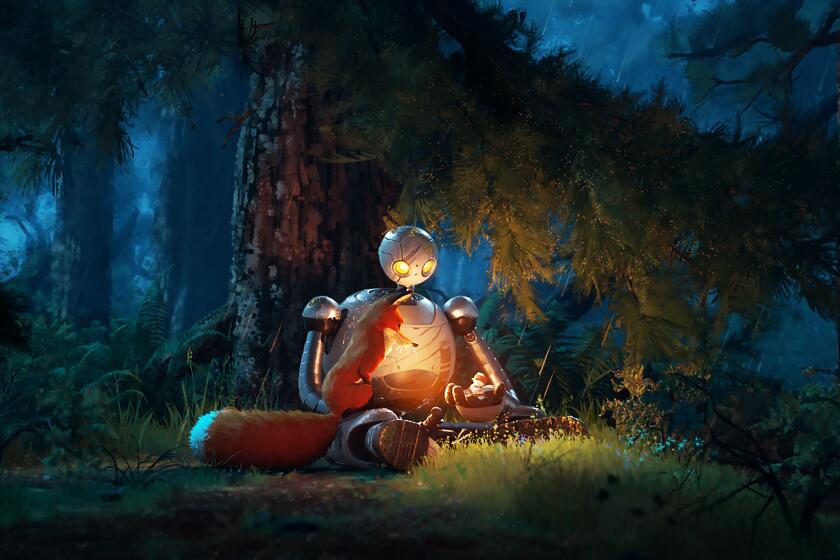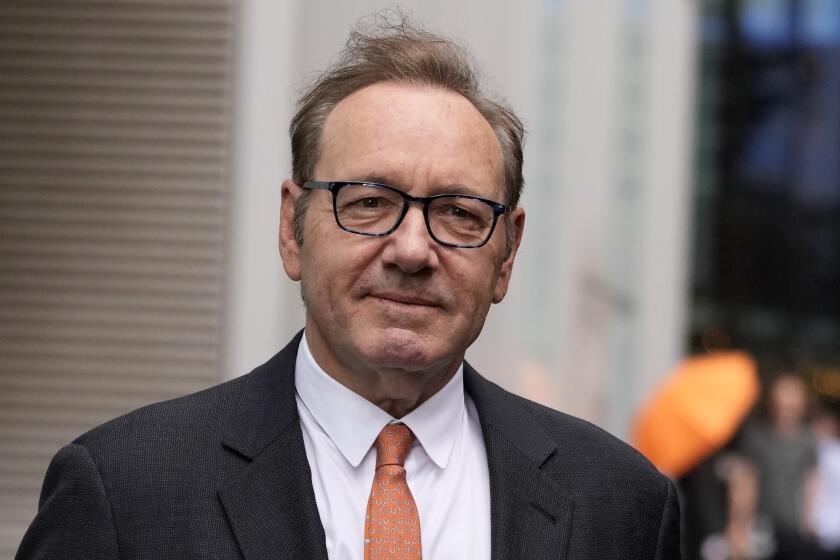MOVIE REVIEWS : Dangerous Games for Power and Fame : ‘Talk Radio’ Takes a Savage Look Under Society’s Surface
Oliver Stone’s “Talk Radio” (AMC Century 14), makes you laugh, makes you mad and keeps you edgily watching for the killers in the shadows. Based on Eric Bogosian’s play, this savagely audacious movie is a dip into the dangerous games played between a performer and his/her audience, a society and its malcontents and the medium of radio and the faceless voices it broadcasts.
At the center of this hurricane, there’s a reptile’s eye. Playing call-in host Barry Champlain, star and co-writer Bogosian has eerily calm, almost expressionless features. Like Bogosian’s smoothed-out radio voice, they’re a crazy contrast to the stream of vituperation, abuse and wild sarcasm bursting from his mouth.
For the record:
12:00 a.m. Dec. 22, 1988 For the Record
Los Angeles Times Thursday December 22, 1988 Home Edition Calendar Part 6 Page 3 Column 4 Entertainment Desk 1 inches; 19 words Type of Material: Correction
“Talk Radio” is playing at the Cineplex Odeon Century Plaza Cinemas and not the AMC Century 14, as reported in Wednesday’s Calendar.
Champlain’s venom is universal, a rampage on an open mike. There’s some mild remnant of ‘60s-era progressive politics in there, anti-war, anti-bigotry, but it’s gotten curdled with scorn and laced with a sour hipster’s contempt for soft-minded patsies and squares who won’t wise up. Champlain reviles a racist redneck, then slams a sympathetic black caller as an “Uncle Tom,” taunts an old lady with jokes about “lesbian priests” and drags a hero-worshiping, drugged-out teen on the air and calls him an idiot. (Kent, the zonked-out teen, is a show-stopper by Michael Wincott.)
As the calls pour in, screened by Champlain’s tireless operator, Stu (John McGinley), the stakes rise, the bitterness escalates, the dark forces gather. Champlain, watched by his lover-producer (Leslie Hope), his idealizing ex-wife (Ellen Greene), his station manager (Alec Baldwin) and a smug network representative (John Pankow), becomes like a crazed actor at the ultimate tryout he knows will make or kill him, pouring out his guts in a frenzied attempt to win by sheer personality, sheer energy.
Bogosian’s original Champlain was a typical “shock jock,” specializing in insult, hang-ups and outrageous opinions, modeled after Howard Stern, Morton Downey Jr., and Denver radio host Alan Berg, whose 1984 murder by a racist gang of Hitler-worshiping bank robbers, is also re-created in “Betrayed.” Bogosian’s play isn’t about Berg. But the movie adds material from Stephen Singular’s reportage on the case, “Talked to Death”: the failed marriage; the stint in a clothes store and his first big break; the fans booing him down at a local sports contest; even the vocal montage that closes the film. Several of the calls, including the rapist dialogue, are from Berg broadcasts.
It’s a weird, uneasy marriage. The bits of Berg’s life pasted onto Champlain are like tailor’s scraps that don’t quite fit. The life of Berg, a 50ish, Jewish ex-trial lawyer, who suffered from decades of alcoholism, epilepsy and failure, doesn’t square with Bogosian’s smooth smirk, cocky arrogance and air of challenging sexiness.
As a transcription of Bogosian’s theater piece, “Talk Radio” is tense, packed and crackling with life. As a dramatic investigation into Alan Berg and his murder, it’s shallow and dubious. But as a synthesis of those two disjointed halves into a volatile whole--a comic-paranoid nightmare about media success, media myths, prejudice and the pathological relationship between performers and their audience--the film is an often dazzling success. Bogosian and the cast are bravura performers; Stone a director with guts and talent.
Champlain is the same mixture of honesty and sleaze, high aspirations and flawed character as James Woods’ reporter in Stone’s “Salvador.” Like that character, Champlain is a catalyst; he drags out the truth, the dark sides. But he’s become a beast in public to win his ratings.
And he becomes a beast in private as well. He tears his life and his ideals to shreds. Honesty becomes a gig and cynicism a crutch.
At times, Champlain shocks us with a kind of truth, but his deepest instincts are now bent on converting himself and his callers into characters. And any vestige of truth is what his more dangerous callers--unregenerate bigots and would-be despoilers--can’t stand to hear, want to kill.
“Talk Radio” takes place mostly in a confined area, a Dallas radio station that becomes like the jury room in “12 Angry Men,” an inexorable closed-in cage through which Robert Richardson’s camera prowls, swoops and circles. There’s not a dull moment in “Talk Radio,” not even a breather.
But beneath the sizzle, there’s a stinger. Stone and Bogosian, like Champlain, open up the mikes, and let all the viciousness, contradictory passions and wild boiling rage lurking under society’s veneer come spilling out. It’s a killing rage, a black torrent. And the scraps of sentiment or tenderness swimming in this bilious stew seem scorched and pale. Champlain, the paranoid performer who believes that his audience wants to kill him (and who is right), is a symbol of the electronic media’s contradictory stance: the balancing act between truth and sex appeal, shock and soothing, selling and telling. There are no solutions here, no panacea.
For “Talk Radio” (MPAA-rated R for sex and language) and perhaps for us, the questions, the honesty and the rage are enough.
More to Read
Only good movies
Get the Indie Focus newsletter, Mark Olsen's weekly guide to the world of cinema.
You may occasionally receive promotional content from the Los Angeles Times.









